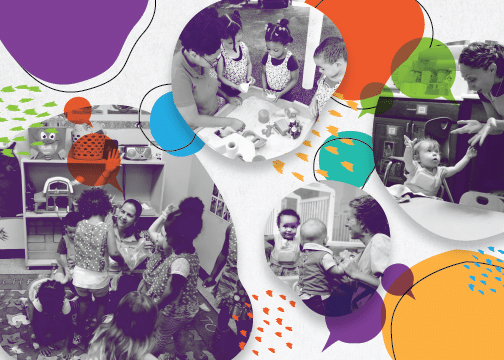When we look back on our childhoods, we can all recall the third-grade teacher who sparked joy in learning, the eighth-grade teacher who spent a little extra time cheering us on when math got tough, or the high school teacher who helped us decide what to do after graduation. Throughout the month of May, and especially Teacher Appreciation Week, we see these shoutouts pop up on Facebook and Instagram, on television talk shows and newspaper features. It’s heartwarming and motivating for our educator workforce.
This year, though, I want to press us harder to think further back in our memories. Gather up those flashes of a well-timed hug, a generous smile, or an enthusiastic morning hello, and take more time to appreciate our early childhood teachers. These are teachers who:
- Showed an interest in our favorite color, asking us about the blue sky and the yellow sun.
- Noticed us noticing patterns in the rug, pushing our curiosity further.
- Got down on our level when we were frustrated, helping us solve our earliest challenges.
- Were happy to be silly with us, engaging in imaginative play.
- Encouraged our first language interactions, setting the stage for all our future learning.
These may seem like simple things, but, if we were lucky enough to have these interactions in our life, they were incredibly important to our development. Far too often, the work of early childhood educators goes unsung.
"Far too often, the work of early childhood educators goes unsung."
For me, I remember Peter Piper. When I was three or four, I could hardly talk. My mother had to convince our neighborhood preschool, Peter Piper, to accept me, on the premise I could understand what was being said even if I couldn’t communicate it back.
My memories are fuzzy, to be honest. I do recall the school’s location in a church basement, a giant teddy bear to hug if you were sad when you were dropped off, and a sense that I was being well-cared for and nurtured by the new adults in my life.
In retrospect, those adults, my earliest teachers, were transformational for my future. I didn’t know then that every time they interacted with me, they were building a foundation that was made to last, boosting my brain growth and social-emotional development when I needed it most. It must have been exhausting, back-breaking, frustrating, and fulfilling at the same time. These teachers, and all early educators, deserve my utmost appreciation, during Teacher Appreciation Week and Month, and during all weeks and months.
I love that LENA Grow makes it just a little bit easier for teachers to help children like me, because they can see their effort at interacting pay off and they can see where small improvements can be made for big outcomes. I think working at LENA is part of how I show of appreciation for those teachers at Peter Piper, who probably could have used our 14 Talking Tips, the data from our talk pedometer, and our brain research to feel supported and validated.
The child care crisis is real. Everyone is feeling it — that includes parents, caregivers, the children themselves, and definitely early educators. Whether it’s through what we do in our professional lives, our advocacy for improved working conditions for early childhood educators, or an extra special thank you for our own community’s teachers, we all have ways to say: “Thank you. I see you. I see how vital your work is. I see how hard your work is. And I see that not everyone else sees it yet.”
I challenge all of us to think back to our earliest years and find a way to thank — and to truly, loudly, enthusiastically, materially appreciate — our early childhood educators. So many of us owe our own bright starts to them, and the work they continue to do for our youngest learners is important and inspiring.






